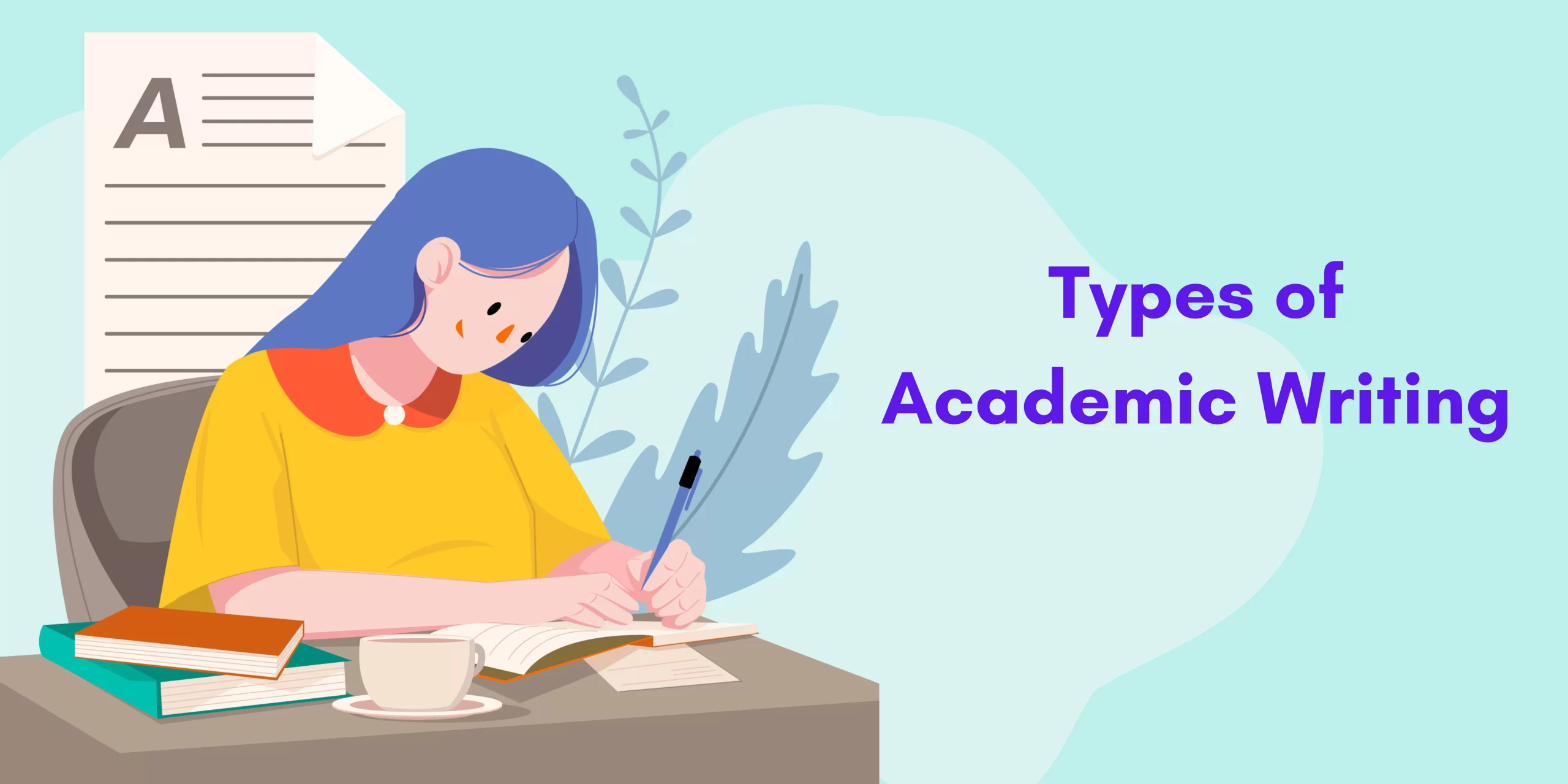Writing is an essential academic skill that individuals pursuing an academic journey need to learn when presenting their work. Essential differences between casual or arts writing and academic writing are that the latter is formulated and supported with research findings and is aimed at presenting information in a persuasive manner. This guide aims at describing the major forms of academic writing, their uses, and guidelines for successful writing.
Why Understanding Different Types of Academic Writing Matters?
Mastering the various types of academic writing is essential for success in academia. Each type serves a specific purpose and requires distinct skills, from analytical thinking to creative expression. By understanding these differences, you can tailor your writing to meet the requirements of each assignment or project.
So let’s talk about the types of academic writing.
Types of Academic Writing
There are many types of academic writing. Some of the most common ones are:
1. Descriptive Writing
Descriptive is the easiest form of writing that an academician is likely to engage in when writing an academic paper. The main function is to present what happened, what exists or what is going on without presenting personal opinion or views. This type of writing is usually found in summing up sections of a paper, in reports and in background information of research papers.
Key Features:
- Objective tone
- Factual and concise
- Use of third-person perspective
Examples:
- Reporting a particular incident in a history paper
- Summarizing the findings of a research study
- Outlining the steps in a scientific experiment
Tips for Mastery:
- Avoid the use of jargon.
- Do not introduce extra elements of one’s own into the experience.
- Structure the information logically to enhance readability.
2. Analytical Writing
Analytical writing can be defined as presenting information beyond description in terms of the relations between the components. Such kind of writing is common in critical essays, literature reviews, and research analysis undertakings.
Key Features:
- Emphasis on interpretation and relationship
- Logical organization of ideas
- Use of evidence to support claims
Examples:
- Priority should be given to interpretation and the interaction between people.
- Logical organization of ideas
- Use of evidence to support claims
Tips for Mastery:
- Create a thesis or research question.
- Divide the material into sections and add headings to the material.
- Support your arguments with credible evidence, such as data or citations.
3. Persuasive Writing
Persuasive writing is also referred to as argumentative as it is written with the purpose to persuade the reader to accept an argument. It is used most commonly in writing essays, proposal and position papers.
Key Features:
- Strong thesis statement
- Logical arguments supported by evidence
- Consideration of counterarguments
Examples:
- Advocating policy changes in political science essays.
- Arguing the significance of a theory in a research proposal
- Writing a persuasive grant application
Tips for Mastery:
- Make sure you understand the role you are playing, what you are for or against.
- Provide argument and fact as your basis for conclusions and observations.
- Address and refute counterarguments to boost your position.
4. Critical Writing
Critical writing is a process of analyzing theories, arguments, or ideas for the purpose of passing a sound judgment. This type of writing is common in postgraduate and postgraduate dissertation, and research critiques.
Key Features:
- Equal evaluation of different aspects
- Synthesis of evidence and arguments
- Logical structure
Examples:
- Conducting an evaluation of a research article in a literature review
- Assessing the advantage and disadvantage of a theory
- Explaining the consequences of the outcomes
Tips for Mastery:
- Develop a clear and logical structure for your arguments.
- Avoid bias and present a balanced view.
- Use evidence to justify your evaluations.
5. Reflective Writing
The reflective writing is another common type of academic writing. It s characterized by incorporation of the writer’s experience and the knowledge gained there from. It is used in journals, portfolios and reflective papers so that students develop self- insight and critical analysis.
Key Features:
- First person perspective and personalized tone
- Learning and experience’s analysis
- Link between practice and theory
Examples:
- Introducing a concept of work placement within a portfolio
- Reflecting on self development in an essay
- Reflecting on how the event that has occurred influenced your learning
Tips for Mastery:
- Always be truthful and self reflective in the writing that is being done.
- Relate or connect personal experiences to what has been learnt in class or taught in a chapter.
- Divide your thoughts in sections such as description, analysis and conclusion.
6. Expository Writing
Expository writing as the name suggests is used to convey information. It is often adopted in academic paper writing, report writing, and also in teaching aids.
Key Features:
- Clear and concise language
- Systematic categorization of knowledge
- Use of examples and evidence
Examples:
- Describing a sequence of steps in a biology report.
- Explaining the consequences of a policy in an essay on public administration
- Giving guidelines for a laboratory activity
Tips for Mastery:
- Try to write short and clear.
- Do not use any extra professional terms or too formal language.
- Where it is possible and useful, try to use tools such as diagrams or charts.
7. Narrative Writing
Narrative writing describes or relates an event or series of events. It is, however, occasionally used in academic writing, especially in case studies or personal statements and sometimes in research reports.
Key Features:
- Chronological structure
- First or third person point of view
- Concentration of the source on aspects of the narrative that include characters and events
Examples:
- The purpose of this paper is to write a case study in the field of social work .
- Writing about a research experience in a thesis introduction
- Writing a personal statement for university admission
Tips for Mastery:
- It is also important to keep focus on the main concepts and avoid concentration on side issues.
- When writing a report, always use bright expressions to make the reader interested.
- Tell as many as possible but make sure that it has some level of academic appeal.
8. Research Writing
Research writing is a process of carrying out a research study and presenting the results. It is the foundation of academic work and encompasses such works as thesis, dissertation and research articles.
Key Features:
- Specific Focus or study purpose
- Detailed methodology section
- The analysis and discussion of results
Examples:
- Master’s Degree Thesis Writing
- Writing up a piece of research finding and submitting it to a research journal.
- Writing a conference paper based on the research done
Tips for Mastery:
- It is important to adhere to the style manual guidelines specific to your discipline of study.
- Properly justify the method being used in the research and results that you got from the research.
- Explain the implications of your study and the drawbacks of the study.
9. Technical Writing
Technical writing is employed to share specific knowledge, which may be in the science, technology, engineering or mathematics disciplines. It comprises laboratory reports, handbooks, and technical papers.
Key Features:
- Use technical terminology
- Accuracy and clarity should be emphasized
- Structured format that contains headings and subheadings
Examples
- Lab report on chemistry
- Development of a user’s guide for a software
- Drafting a technical paper for presentation at an engineering conference
Tips for Mastery
- Utilize diagrams, tables, and charts to help in clarifying complicated information
- Minimize use of jargons and be explanatory about the technical terms.
- Observe conventions in your field of study.
10. Creative Academic Writing
Creative academic writing is creativity integrated with the standards of good academic writing. It is mostly used in areas such as literature, arts and philosophy.
Key Features:
- Original imaginative style
- Tells a story or describes someone or something
- Relates to the scholarly theories or concepts
Examples:
- Using a fictional narrative to represent philosophical questions
- Writing a poetic analysis of a literary text
- Using ethnographic research with creative storytelling
Tips for Mastery
- Balanced creativity with academic integrity
- Make sure that the writing keeps up and is relevant to the purpose of the assigned objectives.
- Creativity should enhance and not overpower your scholarly arguments.
General Tips for Academic Writing Success
- Understand the Assignment: Read the instructions provided carefully in order to understand what type of writing is needed.
- Plan and Outline: To write, you should first plan what you are going to write.
- Use Credible Sources: All the arguments should be backed by credible scholarly sources.
- Edit and Revise: Proofread your work to be sure it is clear and logical and free of grammatical errors.
- Seek Feedback: Discuss your work with peers or teachers with the receiving feedback.
Conclusion
Writing is quite vast and forms the changes that have been made to academic work that is done on a daily basis. Starting with descriptive and analytical writing, followed by persuasive and reflective essays, every type is significant in academic writing. With the help of the given information, it will be possible to improve the writing and accomplish the goals in the academic process.
This ultimate guide works whether you are writing a research paper, a reflective essay, or technical report. Those who have struggled and want to make it in academic writing should not be worried now. We have covered everything for you!










